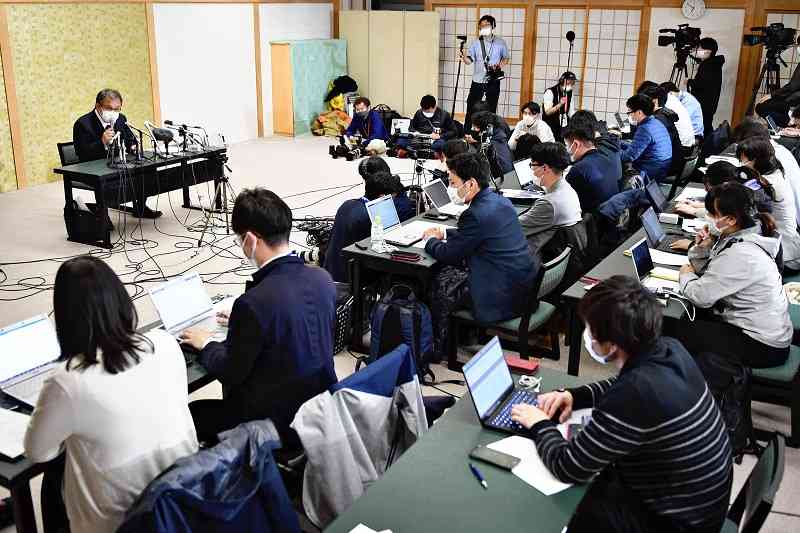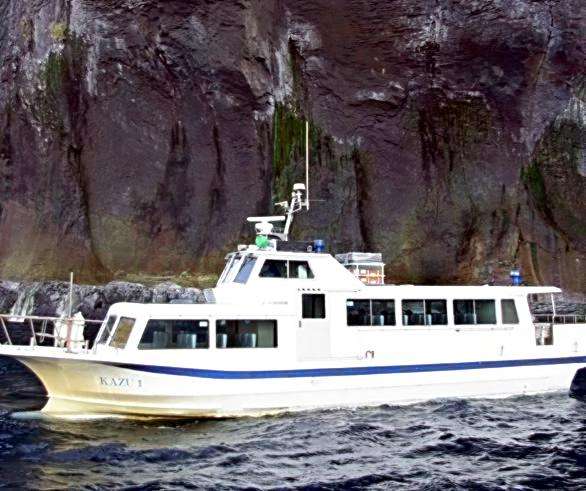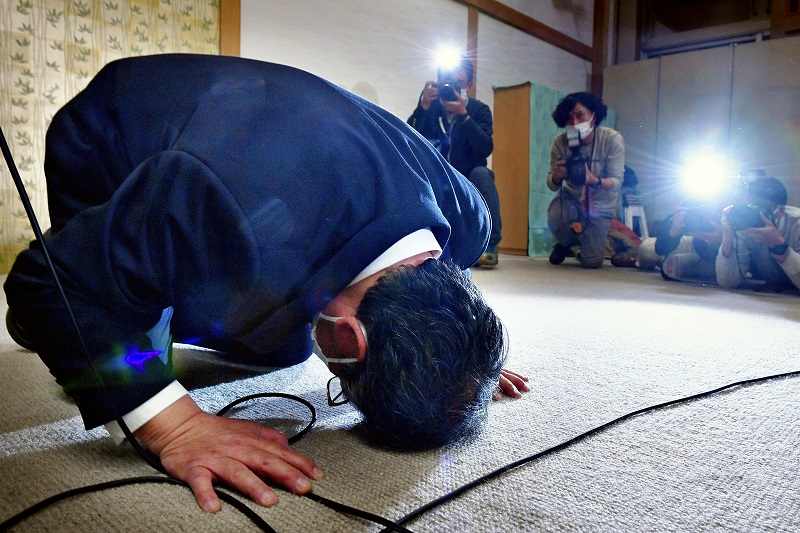
Shiretoko Pleasure Boat President Seiichi Katsurada speaks at a press conference in Shari, Hokkaido, on Wednesday.
15:47 JST, April 28, 2022
The sightseeing boat involved in the deadly accident off Hokkaido should never have left port, the operator’s president has said.
Seiichi Katsurada admitted his responsibility for the decision to allow Shiretoko Pleasure Boat’s vessel to sail Saturday, when it disappeared off the Shiretoko Peninsula with 24 passengers and two crew aboard. No one has yet to be found alive.
Even though gale and high wave advisories were issued Saturday, “the captain reported that sailing was possible, so I decided it was fine,” Katsurada said during a press conference in Shari, Hokkaido, on Wednesday.
“In hindsight, this was a mistake,” the 58-year-old said.
After finding 11 bodies early on after the accident occurred, the Japan Coast Guard and other parties are still searching for 15 people and the boat, Kazu I.

Kazu I, the sightseeing boat involved in Saturday’s deadly accident
According to Katsurada, the company’s guidelines are to not set sail if the wave height is 1 meter or higher and the wind speed is at least 8 meters per second (28.8 kph).
Although inclement weather advisories were issued that day, Katsurada said that at 8 a.m. Saturday, Noriyuki Toyoda, the 54-year-old captain of Kazu I, told him sailing was possible.
“At the time, it was not windy and there were no strong waves,” Katsurada said. “I discussed with the captain and made the decision he could sail on the condition that he would turn back if the sea became rough.”
He emphasized that the ship was operating on a “conditional basis.”
“It was supposed to turn back, but the decision to set sail was a mistake,” he said.
Even if the boat had turned back in the middle of a planned sailing route, passengers would still have been required to pay a certain fee.
Of the four companies operating small sightseeing boats on the western side of the Shiretoko Peninsula, Shiretoko Pleasure Boat was the only one that departed that day. When asked if Katsurada was prioritizing profit, he denied it.
“I always consider profit, but I don’t force boats to set sail for that reason,” he said.
Katsurada said that it was not until the morning of the accident that he became aware that the radio antenna at the company office in Shari was broken.
“I did not make the decision to cancel the sailing,” Katsurada said, “because it was possible to communicate by cell phone and other boat operators’ radios.”
Kazu I departed at 10 a.m. Saturday. At 1:13 p.m., Toyoda radioed another sightseeing boat operator to say, “We are at Kashuni Falls and will be late returning.” Five minutes later, the captain called for help, saying that the bow of the boat was taking on water.
At that time, the wave height near the site of the boat’s disappearance was over 2 meters.
“As it turned out, the company’s safety management was not thorough,” Katsurada said.
As for the cause of the accident, he said: “I don’t know. It was all my negligence.”
Katsurada added that a captain should generally have about three years of experience as a deckhand, but Toyoda was appointed captain after about a year because a veteran captain recommended him.
“I heard that Toyoda has a great feel for the job,” Katsurada said. “He also had experience piloting water-buses.”

Shiretoko Pleasure Boat President Seiichi Katsurada apologizes for a sightseeing boat accident at a press conference in Shari, Hokkaido, on Wednesday.
Prior to Wednesday’s press conference, Katsurada explained the circumstances of the accident to the families of the passengers. According to those in attendance, Katsurada apologized on his hands and knees and distributed explanatory materials. The families did not hide their anger, though, with some demanding to know why he let the boat leave and mocking the materials. The meeting lasted more than two hours instead of the scheduled hour.
Maritime accident expert Prof. Yoshihiko Yamada of Tokai University told The Yomiuri Shimbun that he feels Katsurada does not have sufficient knowledge of ship operations management.
“It is incomprehensible for a boat to leave port without radio communications intact,” Yamada said. “Normally, a boat would sail only after repairs were made and an operator confirmed that the radio works.”
It is not always possible to communicate using a mobile phone at sea, he said, adding that if a company uses another firm’s radio, it should place an employee constantly in front of the receiver.
The professor also said the captain perhaps lacked experience.
“One year of experience during the coronavirus pandemic is not enough,” Yamada said. “I suspect he did not have much hands-on experience.”
Top Articles in Society
-

Producer Behind Pop Group XG Arrested for Cocaine Possession
-

Man Infected with Measles Reportedly Dined at Restaurant in Tokyo Station
-

Man Infected with Measles May Have Come in Contact with Many People in Tokyo, Went to Store, Restaurant Around When Symptoms Emerged
-

Woman with Measles Visited Hospital in Tokyo Multiple Times Before Being Diagnosed with Disease
-

Australian Woman Dies After Mishap on Ski Lift in Nagano Prefecture
JN ACCESS RANKING
-

Japan PM Takaichi’s Cabinet Resigns en Masse
-

Japan Institute to Use Domestic Commercial Optical Lattice Clock to Set Japan Standard Time
-

Israeli Ambassador to Japan Speaks about Japan’s Role in the Reconstruction of Gaza
-

Man Infected with Measles Reportedly Dined at Restaurant in Tokyo Station
-

Videos Plagiarized, Reposted with False Subtitles Claiming ‘Ryukyu Belongs to China’; Anti-China False Information Also Posted in Japan

















